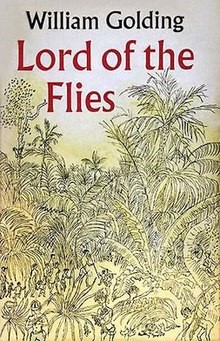
This project promotes open access materials and has been funded with support from the European Commission - Erasmus+ program. These materials reflect the views only of the author, and the Commission cannot be held responsible for any use which may be made of the information contained therein.
[Project Number: 2016-1-HR01-KA201-022159]
![]()
Title of Activity - Lord of The Flies
Description of educational activity
Duration: 2 x 45 minutes
Pupils’ age: 15-17
Organization of the class of pupils: frontal, individual, text-based, focused conversation, writing, group work
The aim of the lesson:
- to acquire knowledge about the allegorical novel
• analyze the work (characters, themes, fables, novel features)
• explain the idea of a novel
• enrich understanding of life, man and society
• explain the personal attitude towards the destiny of the characters: the issue of leadership in the community, murders, relationships with others
• rich dictionary and knowledge of general culture
• develop the ability of critical thinking, explanation and conclusion, perception, and perception
• explain attitude towards the main issues that the novel poses
• observe the positive and negative side of behavior and actions of characters
• develop the ability to apply the theory of literature in a particular literary work
Support materials:
- Internet
- Art
- Movie
Handouts :
- PPpresentation
- photos
- youtube clips
Activities
- reading, working on text, oral presentation, writing
- Pre-reading activities
Provide motivation and background information to facilitate reading and enabling students to put the novel in a broader, non-literary and literary context. Also, before reading, students get directions and provocative questions and thus encourage active reading, making notes during reading, making arguments and paraphrases, comparing literary and film-based essays.
Some guidelines, research topics, provocative questions:
• explore the phenomenon of night terror
• choose the favorite character and explain your choice
• list at least 5 characteristics of a good leader and state one general example of a good leader; is there an example of such a leader in the novel and explain the answer
• see the organization of the life and work of the boys on the desolate island; is it well designed and is it sustainable
• Why the community described in the novel didn’t survive?
• explain the notion of democracy and what it implies
• how much the novel's work would differentiate between girls and mixed sex groups on the island.
As a experience-cognitive motivation, use the paintings of Theodore Gericault Splav Meduze. Students talk about their experience of the atmosphere transmitted by the image and whether the motif of the image can be linked to the theme of the novel. Can they be placed in the position of people on the rafters, like boys in the novel - on a desolate island. How would they feel in such conditions?
In school library we organise an exhibition of similar novels with similar theme as Lord of the flies.

Short description of digital sources
https://en.wikipedia.org/wiki/Lord_of_the_Flies
https://www.imdb.com/title/tt0100054/
https://www.youtube.com/watch?v=-tXpA3dIEtI
https://www.youtube.com/watch?v=puglTctwozM
Results/ What we learned – Outcomes
The expected outcomes of the lesson:
Students will be able to demonstrate:
• clearly critical / analytical understanding of author's intent and deeper implications for texts and attitudes
• notice the allegory of the text
• apply knowledge of text in everyday life, especially in the field of moral-ethical behavior of individuals and the impact of such behavior on the development of the community
Reccomendations
Lord of the of Flies opens up a whole range of social issues so it is easily linked to civic education. The text also opens up a series of questions concerning personal attitudes about morality, ethics, and psychology of man in inhumane conditions. That is why the text is appropriate for RSP readers. Well-read reading before, during and after training allows each teacher to enter an individual approach to issues by knowing the affinities and interests of their students.
Contact
X gimnazija ''Ivan Supek''
Ul. Vjekoslava Klaića 7
10000
Zagreb
E-mail: partners@handbook4rspreaders.org










